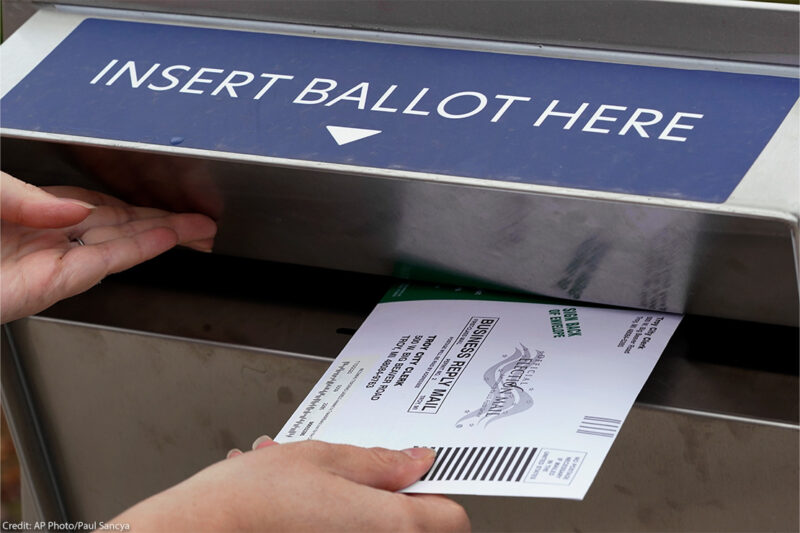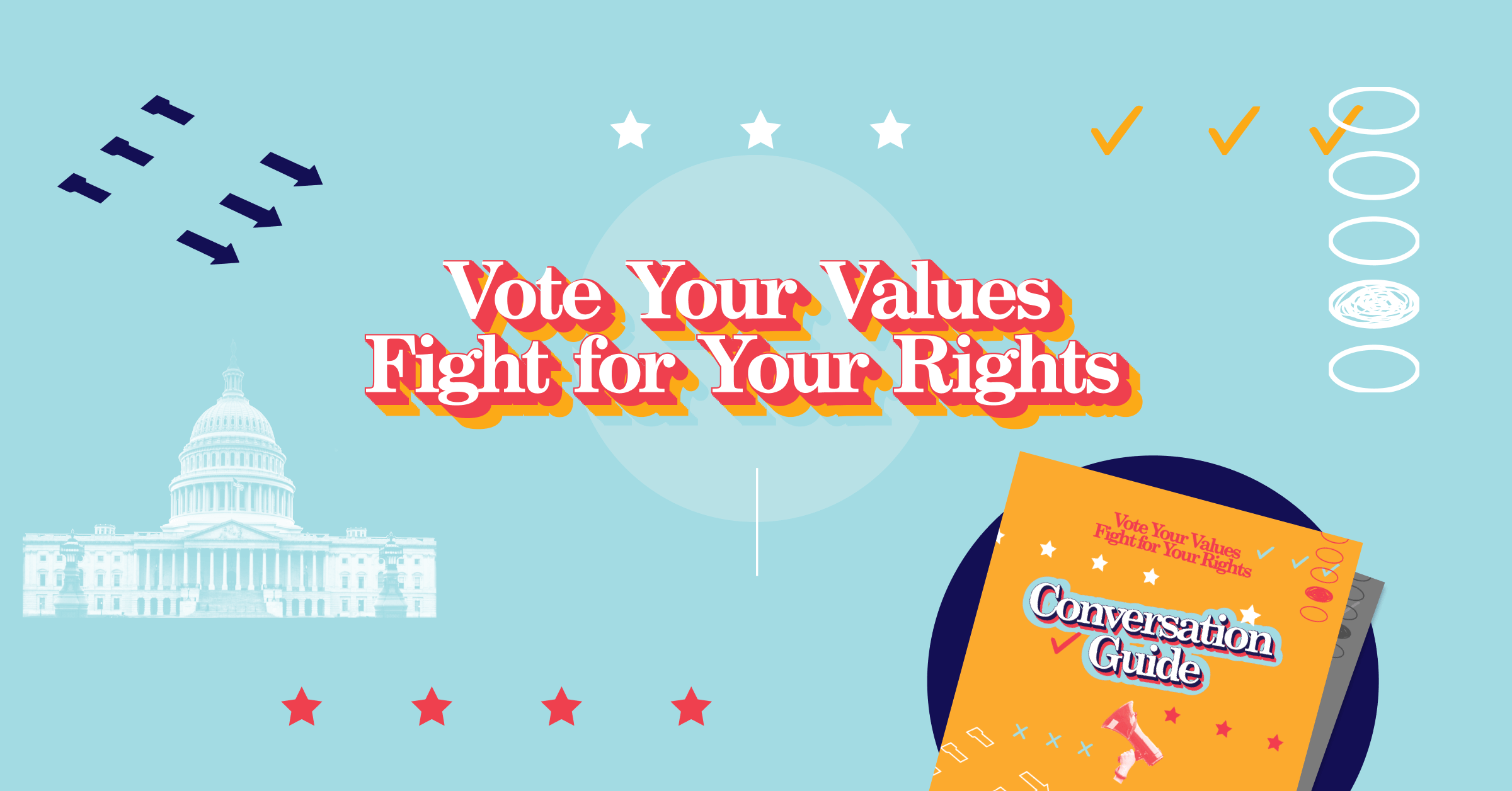How to Fight for Your Rights at the Ballot Box


As midterm elections near, there is no question that we are facing a real and existential threat to our basic human rights and the fundamentals of American democracy. Engendered by the election of Donald Trump to the Presidency in 2016, and emboldened by the January 6 insurrection in 2021, we have an important opportunity to make sure our elected officials commit to standing up for the values we hold dear: the right to bodily integrity, the right to access abortion, the right to have your vote counted.
These fights have moved in full force to the states. Most people understand the importance of who sits in the governor’s mansion, but it’s also true that secretaries of state, state attorneys general, state supreme courts, state legislators, and county clerks all wield extraordinary power in our government. That’s why we are doubling down on “down-ballot” races, where voters can cast an informed vote and hold these elected officials accountable.
The ACLU is nonpartisan, so we don’t tell voters who to vote for, but we do inform voters about what is at stake in an election. Here’s a quick snapshot of the types of civil liberties and civil rights issues that could be on your ballot.

Vote Your Values
This election, join us by pledging to vote for your values, and fight for your rights by encouraging your friends and family to do the same.
Source: American Civil Liberties Union
Abortion Access is Facing a Dire Moment
Because the U.S. Supreme Court overturned Roe v. Wade, states are now more empowered to restrict or ban abortion care outright. So, we’re taking our fight to the states and elected officials to create a firewall to protect abortion access.
Starting with a ballot initiative in Michigan, we’re working to pass Proposal 3, which would ensure every Michigander has the fundamental right to reproductive freedom, including the ability to make personal medical decisions about pregnancy, birth control, abortion, prenatal care, and childbirth. Michiganders are energized and motivated now more than ever to restore the protections of Roe v. Wade through this initiative, with a record number of signatures — more than 730,000 — putting it on the ballot.
In Vermont, we are working to ensure every Vermonter has the right to make their own reproductive decisions, including whether and when to become a parent, use or refuse birth control, or seek abortion care by passing Proposal 5. In Kentucky, our coalition is fighting against a constitutional amendment on the November ballot that would pave the way for a complete abortion ban. We're urging voters to vote no on Amendment 2 to protect the rights of people to control their own personal, private medical decisions.
While ballot measures are an important part of our strategy, elected officials at all levels of state government will have a hand in either protecting or restricting abortion access, so we’re engaging in key state races that will impact this right. State supreme court judges can and often do find that state constitutions protect more rights than the U.S. Constitution, making them a powerful backstop against the attacks of radical, anti-abortion rights minorities. Now, state courts will likely be the final arbiters to decide whether our reproductive freedom is protected in the states. So for the first time, we’re focusing on state supreme court races, specifically in North Carolina, to hold a pro-abortion rights majority of 4-3.
In Kansas, where pro-abortion rights voters recently defeated an anti-abortion ballot initiative, we have to fight to protect that win by engaging in state House races to prevent the legislature from gaining enough votes to override a veto from the state’s pro-abortion rights governor. We are also working to make sure that local prosecutors will not prosecute individuals accused of accessing an abortion in states where care is banned by educating voters in places like Maricopa County, Arizona, about the candidates’ positions in their district attorney races. When we elevate this issue in races in states that have banned abortion, it places pressure on politicians to not enforce bans or pass new ones.
Voting Rights are Local
There is no more fundamental right in a democracy than the right to vote. It is how we make sure our voices are heard. It is how we hold politicians accountable. It is how all the other rights guaranteed to us under the federal and state constitutions can be protected. Yet that right is under attack in state after state. The Big Lie about the 2020 presidential election has emboldened those who would take away the right to vote from those with whom they disagree.
In Michigan, we are fighting back against voter suppression efforts that took hold after the 2020 election and the passage of a ballot initiative in 2018 that made it possible to engage in no-excuse absentee voting and same day registration. We led the 2018 ballot initiative and are prepared to defend that win with measures that would prevent an election steal. Proposal 2 will allow nine days of early voting, require pre-paid postage for absentee applications and ballots, require military and overseas ballots to be counted if postmarked by Election Day, and require ballot drop boxes for every 15,000 voters in a city. It will also protect the vote against the anti-democratic tactics that other states used during the 2020 election, by establishing that post-election audits may be conducted by state and local officials and that canvassing boards may only certify election results based on official vote counts. Proposal 2 will enhance election integrity and increase election security by modernizing how we administer elections to ensure every vote counts.
And in Connecticut, voters will be able to pass a ballot measure that will allow early voting in the state.
In most states, the integrity of the vote depends upon the secretary of state as the state’s chief election officer responsible for the oversight and administration of elections. So in Arizona, Minnesota, and Nevada, we are educating voters about candidates for this important office. Secretaries of state can expand voting access by implementing measures such as automatic voter registration and universal mail-in voting, and advocate for a legislative agenda that pushes for greater access to the ballot.
Racial Justice and Immigrants’ Rights are at Stake
There are many other important issues at stake during this midterm election. Across the nation, voters will have the chance to send a clear message to elected officials that they oppose efforts to ban books and prevent students and teachers from discussing race and gender in their classrooms. We will not let politicians infringe on our right to learn by imposing their own partisan interests or political and religious beliefs in our classrooms.
We are working to make sure that in places like Arizona, immigration status is not a barrier to education. Proposition 308 would enable any person who has lived in the state for two or more years and graduated from a state high school to attend Arizona colleges, regardless of immigration status.
In Colorado, the No Eviction Without Representation ballot measure will ensure that Denver families will have equal and fair access to legal counsel when faced with housing injustice. This will help ensure all people — especially communities of color and women, who disproportionately face the threat of eviction — have access to safe and stable housing.
Vote Your Values
Your vote is your voice. Vote for what matters to you, and vote for the people you know will protect what matters to you. Make a plan and recruit friends and family to join you at the polls. For more on how you can vote for your values and fight for your rights, check out our midterm conversation guide, available here.
Paid for by American Civil Liberties Union, Inc., 125 Broad Street, New York, New York 10004, in coordination with Reproductive Freedom for All.
Paid for by American Civil Liberties Union, Inc. in coordination with Vermont for Reproductive Liberty.
Paid for by American Civil Liberties Union, Inc. in coordination with Protect Kentucky Access.
Paid for by American Civil Liberties Union, Inc., 125 Broad Street, New York, New York 10004, in coordination with Promote the Vote 2022.
Paid for by American Civil Liberties Union, Inc., in coordination with ACLU of Connecticut Rise PAC Incorporated.
Paid for by American Civil Liberties Union, Inc. in coordination with Yes on 308.
Paid for by American Civil Liberties Union, Inc. and authorized by NEWR Denver.


